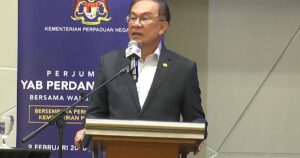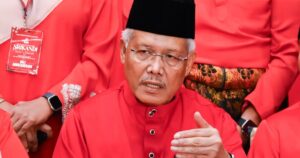
From Faiz Abdullah
While economic certainties are breaking apart at the seams due to fragmentation, digital disruption and rising protectionism, the tabling of the 13th Malaysia Plan (13MP) under the Madani government could not have come at a more critical juncture.
Where once there was predictability and stability, bolstered by robust competition, the global landscape is now dominated by intense strategic rivalry and geo-economic uncertainty.
Long a trading nation and a highly open economy, Malaysia must navigate these treacherous waters, exposed to global headwinds, not least the Donald Trump administration’s reimposition of tariffs.
The current 19% duty on most Malaysian exports to the US, though a reduction from earlier announcements, reflects a difficult compromise.
Exemptions for key sectors such as semiconductors soften the blow, but the overall message is clear — trade is becoming more politicised, and diversification is no longer optional but essential.
Some have suggested that Malaysia’s arrangement with the US bears little distinction from those secured by its regional peers or, worse, represents a form of quiet capitulation.
Such critiques overlook a key reality — economic diplomacy in today’s climate is no longer about extracting perfect outcomes but about managing asymmetries wisely.
Malaysia’s approach has been guided by strategic calculus, not submission, and herein lies the difference.
Malaysia has safeguarded critical policy space, including Bumiputera affirmative action, protective tariffs for strategic industries such as automotives and the continued issuance of approved permits, all while ensuring continued dialogue with Washington.
The 13MP responds to these realities with a forward-looking framework that positions the country for resilience and renewal. It outlines a vision of strategic autonomy rooted in structural reform, domestic capacity-building and constructive global engagement.
Building strength for a digital and industrial future
A central theme of the 13MP is the development of “Made by Malaysia” products, anchored in existing policy documents such as the New Industrial Master Plan 2030.
In addition to prioritising research, commercialisation and innovation, the 13MP supports high-growth sectors, aims to attract high-impact investments, and strengthens the nation’s talent base.
This ambition is writ large in the commitment to artificial intelligence (AI) and digital transformation. Malaysia must move beyond backend assembly in global value chains.
The RM10 billion investment by Nvidia, partnering Khazanah Nasional Bhd, reflects international confidence in Malaysia’s capacity to become a regional pivot for high-performance computing, AI infrastructure and data governance.
Yet, this is only the beginning. The 13MP envisions nurturing home-grown innovations, making domestic firms more competitive and equipping Malaysians for the technological frontier.
It advances these goals by strengthening industry-academia collaboration, supporting the AI ecosystem under the National AI Roadmap, and promoting agile governance through regulatory sandboxes.
At its core, the 13MP is about economic, institutional and societal resilience. The focus is on value creation and long-term quality investment, where public spending and policy incentives serve strategic objectives, such as boosting domestic value capture and supporting high-impact sectors.
As for the National Energy Transition Roadmap, gearing the nation towards a low-carbon, high-value economy, the kicker is in catalytic projects and investment opportunities in green hydrogen, solar manufacturing and grid modernisation.
Energy resilience and environmental stewardship are crucial to ensure we aren’t left at the starting block in the global green economy race while laying the foundation for new industrial ecosystems that align with long-term national interests.
Reclaiming global relevance through economic diplomacy
Malaysia’s tradition of non-alignment remains a key advantage. Our credibility with both East and West, combined with a reputation for moderation and consistency, positions us to bridge divides in a fractured global order.
The 13MP builds on this by encouraging deeper engagement with emerging markets, reinforcing commitment to multilateral platforms such as the Regional Comprehensive Economic Partnership, and reaffirming Malaysia’s leadership role in Asean as well as participation in BRICS.
Economic diplomacy, in this regard, is not incidental but a core pillar of the 13MP, demonstrating the inextricable link between domestic reform and global positioning.
By expanding trade relations with sub-Saharan Africa and Latin America and leveraging existing trade agreements, the 13MP seeks to fortify resilience in an era of shifting power and contested norms.
Its call for fairness, predictability and sovereignty in digital and trade governance reflects long-term strategic interests.
Still, the 13MP is only as strong as its execution. While Malaysia has never lacked for vision, the adage that between the ideal and the reality falls the shadow of incoherence and failure sometimes still rings true.
Nevertheless, we take heart that the 13MP introduces mechanisms for inter-agency coordination, performance tracking and institutional accountability. This is vital considering that we were once dragged down by a system that prioritised form over substance.
In order to truly appreciate the role of the 13MP in today’s context, we must move beyond outdated critiques and assess what national planning means in an era of complexity and disruption.
It has become fashionable among some commentators to dismiss Malaysia’s five-year plans as relics of Soviet-style economic totalitarianism. But this ignores both the evolution of the planning process and the complexity of modern governance.
Unlike Stalinist central planning, the 13MP does not attempt to micromanage the economy, nor does it presume to absolutely override market mechanisms.
Instead, it provides strategic clarity in areas where the market alone cannot resolve collective dilemmas such as climate resilience, energy security, digital infrastructure and regional inequality.
Clearly, Adam Smith’s “invisible hand” has remained largely invisible in times of economic turmoil. Intervention, where strategically planned and executed, is imperative.
Most importantly, the 13MP is not a promise of overnight transformation. Real change demands political will, technocratic skill and broad societal alignment. It calls for the courage to move beyond antiquated paradigms and the discipline to commit to long-term thinking.
In the end, the 13MP represents a new understanding of development. It is not about managing scarcity or distributing subsidies, but about unlocking potential, building strategic capacity and preparing for a future that will not wait.
If we approach the implementation of the 13MP with the same earnestness and clarity with which it was conceived, Malaysia can do more than weather the global storm.
We can reclaim our agency, shape our regional future and advance a model of shared prosperity rooted in resilience, inclusion and innovation.
A tall order no doubt, but by no means unattainable.
Faiz Abdullah is chairman of the Institute of Strategic & International Studies.
The views expressed are those of the writer and do not necessarily reflect those of FMT.






